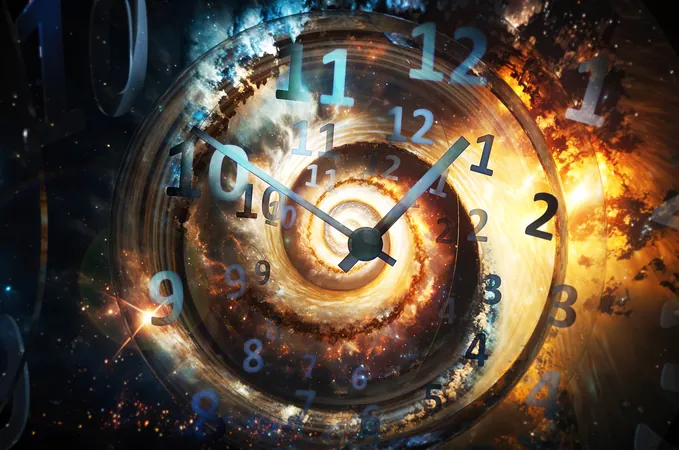
Is Time Just an Illusion? The Mind-Bending Theories Challenging Our Perception of Reality!
2025-01-10
Author: Ling
Time is a given in our everyday lives. We set our alarms, manage schedules, and live by the ticking of clocks, yet some of the brightest minds in theoretical physics are questioning its very existence. While it seems self-evident, there is growing evidence that time as we perceive it might be more of a construct than a fundamental aspect of reality.
A number of researchers argue that the linear perception of a flowing "now" could simply be a clever illusion crafted by our brains. The unsettling notion that time might not exist in any tangible form challenges us both scientifically and philosophically. What if our understanding of time is merely a reflection of our sensory experiences rather than an objective reality?
The Paradox of Time Perception
In everyday scenarios, we function under the assumption that the past, present, and future are distinct and crucial to our lives. We remember past experiences, make plans for the future, and manage our time accordingly. However, physicists like Dr. Carlo Rovelli of Aix-Marseille University argue that the equations governing the universe do not provide support for the concept of a universally recognized "now."
This divergence between our perceptions and theoretical physics raises profound questions about what we actually understand time to be. Our intuitions suggest a continuous flow, yet, according to Einstein's theories, every moment in time could exist equally, like frames in a movie, challenging our instinctual grasp of time’s progression.
The Relativity of Time: Mind Over Matter
Einstein's theories of relativity reveal the complexities of time's nature. His special theory of relativity posits that time is not uniform; it is affected by speed and gravity. Travelers near the speed of light or in strong gravitational fields experience time differently than those in unaffected environments— a phenomenon aptly named "time dilation."
Experimental evidence shows that atomic clocks at different altitudes tick at slightly different rates, illustrating that time is relative. This unsettling idea pushes us to consider: if time can be manipulated, how then can we trust our perception of its flow?
The Flow of Time: A Cognitive Construct?
Everyday experiences lead us to believe in a continuous movement through time, but many physicists suggest that this flow may not be intrinsic to time itself but rather a mental construct that our brains create. Researchers theorize that our memories and narratives form an interconnected web, giving rise to the perception of time moving from past to present to future.
Additionally, the concept of entropy is key in understanding our perception of time. According to the second law of thermodynamics, entropy, or disorder, tends to increase over time—this aligns with our observations of irreversible processes. Thus, the “arrow of time” that we perceive, which seems to take us from past to future, is perhaps just a statistical byproduct of the universe moving toward chaos.
Why Do We Perceive Time?
Experts speculate that time might one day be viewed as a sophisticated accounting tool akin to currency—convenient but not fundamentally significant. However, regardless of its philosophical implications, our lives are deeply intertwined with the passage of time. Our daily rhythms are governed by seconds, minutes, and hours, leading us to firmly believe in the reality of our experiences as they unfold.
The mystery remains: Why do we, as humans, hold on so tightly to the concept of time? Will our understanding evolve alongside our cognition? As we delve into the realms of physics and consciousness, one thing is clear: the quest to understand time is ongoing, and the truth may be more complex than we can currently comprehend.
Conclusion: The Big Question Remains
As the debate about the nature of time continues, we are left to ponder the vital question: Will we ever fully grasp the essence of time, or is it destined to remain an everlasting enigma? Only time—whatever that may mean—will tell.
Stay tuned for more captivating insights into the mysteries of the universe that challenge our understanding of reality!




 Brasil (PT)
Brasil (PT)
 Canada (EN)
Canada (EN)
 Chile (ES)
Chile (ES)
 Česko (CS)
Česko (CS)
 대한민국 (KO)
대한민국 (KO)
 España (ES)
España (ES)
 France (FR)
France (FR)
 Hong Kong (EN)
Hong Kong (EN)
 Italia (IT)
Italia (IT)
 日本 (JA)
日本 (JA)
 Magyarország (HU)
Magyarország (HU)
 Norge (NO)
Norge (NO)
 Polska (PL)
Polska (PL)
 Schweiz (DE)
Schweiz (DE)
 Singapore (EN)
Singapore (EN)
 Sverige (SV)
Sverige (SV)
 Suomi (FI)
Suomi (FI)
 Türkiye (TR)
Türkiye (TR)
 الإمارات العربية المتحدة (AR)
الإمارات العربية المتحدة (AR)